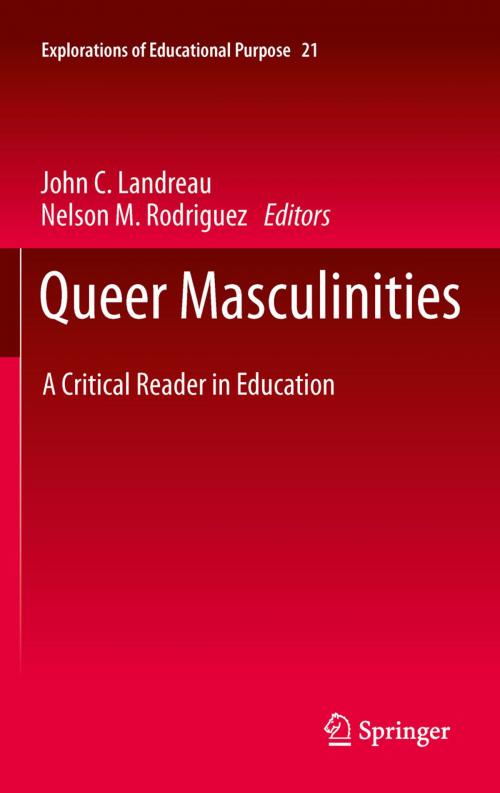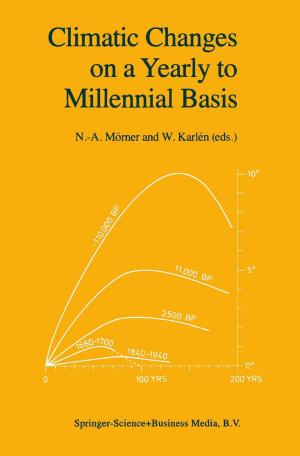Queer Masculinities
A Critical Reader in Education
Nonfiction, Reference & Language, Education & Teaching, Educational Theory, Philosophy & Social Aspects, Social & Cultural Studies, Social Science, Gender Studies| Author: | ISBN: | 9789400725522 | |
| Publisher: | Springer Netherlands | Publication: | September 28, 2011 |
| Imprint: | Springer | Language: | English |
| Author: | |
| ISBN: | 9789400725522 |
| Publisher: | Springer Netherlands |
| Publication: | September 28, 2011 |
| Imprint: | Springer |
| Language: | English |
Queer Masculinities: A Critical Reader in Education is a substantial addition to the discussion of queer masculinities, of the interplay between queer masculinities and education, and to the political gender discourse as a whole. Enriching the discourse of masculinity politics, the cross-section of scholarly interrogations of the complexities and contradictions of queer masculinities in education demonstrates that any serious study of masculinity—hegemonic or otherwise—must consider the theoretical and political contributions that the concept of queer masculinity makes to a more comprehensive and nuanced understanding of masculinity itself.
The essays adopt a range of approaches from empirical studies to reflective theorizing, and address themselves to three separate educational realms: the K-12 level, the collegiate level, and the level in popular culture, which could be called ‘cultural pedagogy’. The wealth of detailed analysis includes, for example, the notion that normative expectations and projections on the part of teachers and administrators unnecessarily reinforce the values and behaviors of heteronormative masculinity, creating an institutionalized loop that disciplines masculinity. At the same time, and for this very reason, schools represent an opportunity to ‘provide a setting where a broader menu can be introduced and gender/sexual meanings, expressions, and experiences boys encounter can create new possibilities of what it can mean to be male’. At the collegiate level chapters include analysis of what the authors call ‘homosexualization of heterosexual men’ on the university dance floor, while the chapters of the third section, on popular culture, include a fascinating analysis of the construction of queer ‘counternarratives’ that can be constructed watching TV shows of apparently hegemonic bent. In all, this volume’s breadth and detail make it a landmark publication in the study of queer masculinities, and thus in critical masculinity studies as a whole.
Queer Masculinities: A Critical Reader in Education is a substantial addition to the discussion of queer masculinities, of the interplay between queer masculinities and education, and to the political gender discourse as a whole. Enriching the discourse of masculinity politics, the cross-section of scholarly interrogations of the complexities and contradictions of queer masculinities in education demonstrates that any serious study of masculinity—hegemonic or otherwise—must consider the theoretical and political contributions that the concept of queer masculinity makes to a more comprehensive and nuanced understanding of masculinity itself.
The essays adopt a range of approaches from empirical studies to reflective theorizing, and address themselves to three separate educational realms: the K-12 level, the collegiate level, and the level in popular culture, which could be called ‘cultural pedagogy’. The wealth of detailed analysis includes, for example, the notion that normative expectations and projections on the part of teachers and administrators unnecessarily reinforce the values and behaviors of heteronormative masculinity, creating an institutionalized loop that disciplines masculinity. At the same time, and for this very reason, schools represent an opportunity to ‘provide a setting where a broader menu can be introduced and gender/sexual meanings, expressions, and experiences boys encounter can create new possibilities of what it can mean to be male’. At the collegiate level chapters include analysis of what the authors call ‘homosexualization of heterosexual men’ on the university dance floor, while the chapters of the third section, on popular culture, include a fascinating analysis of the construction of queer ‘counternarratives’ that can be constructed watching TV shows of apparently hegemonic bent. In all, this volume’s breadth and detail make it a landmark publication in the study of queer masculinities, and thus in critical masculinity studies as a whole.















